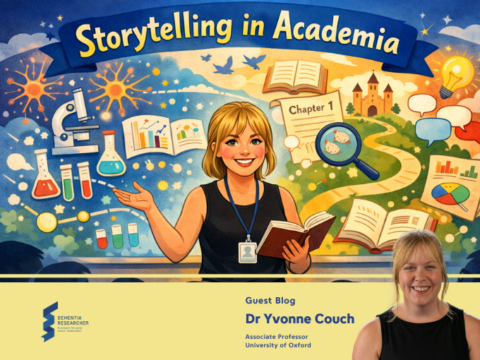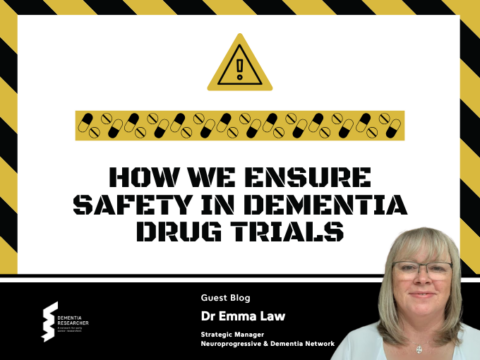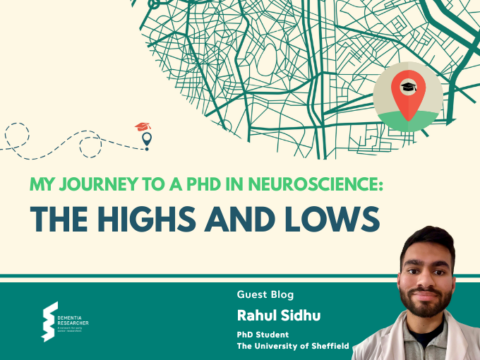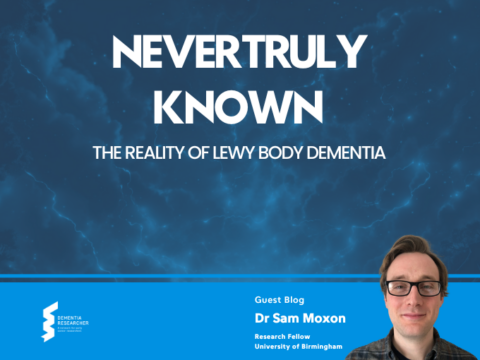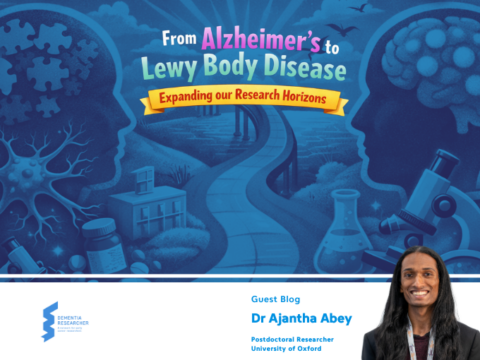There is no doubt that technology is dramatically changing the landscape of health and social care, and dementia care is no exception. My research is focused on exploring people with dementia’s perceptions and experiences of smart home technology. ‘Smart homes’ are one of the ways being proposed in which technology may be used to prevent hospitalisations and enable people to remain living in their own homes for longer. An appealing proposition perhaps, but a concept which I’ve found to be divisive when I’ve talked to people: will these systems promote independence and greater freedom, or is this Big Brother? It is important that we learn more about what people with dementia think of this type of home technology, and that their voices are central to the design and development of these systems so that the resulting services are ethical, engaging and effective.
I’m a speech and language therapist by background. I’m interested in how we can support the communication of people with speech, language and cognitive difficulties and ensure they have as much of a place at the table as those without communication difficulties. I’ve been on a steep learning curve this year, being new to research and also to the world of smart technology. So I’ll start by explaining a bit more about the smart homes, for those who- like me a couple of years ago – have only quite a fuzzy idea of the concept.
What exactly is a smart home?
You may be familiar with the idea of a smart home for general use – perhaps it conjures up ideas of automated lighting, heating, appliances, and entertainment systems you can talk to and control centrally from apps on your phone. Smart homes developed for use in health and social care go beyond this, and consist of a network of devices installed in someone’s home which together aim to monitor not just the ambient temperature and turn on the music, but someone’s health and wellbeing. Where I am based, at the UK Dementia Research Institute’s Care Research and Technology Centre at Imperial College London, the system being developed uses a combination of medical devices (thermometers, blood pressure monitors, smart weighing scales and so on) along with passive sensing devices such as door sensors, sleep mats, motion sensors, and smart plugs, to link health measures with everyday living activity. The patterns of behaviour detected over time mean that the artificial intelligence can detect changes – perhaps someone becoming agitated and more prone to night-time wandering, or indicators of self-neglect such as an absence of fridge opening or kettle use which previously they had been doing regularly. By using this system of artificial intelligence, changes in behaviour may be detected earlier than they would through health or social care services, or in some cases even earlier than by members of the family or other carers. This early detection means preventative interventions can be put in place quickly: treatment for a developing urinary tract infection, or a care package to promote better sleep habits, for example.

The UK DRI Care Research & Technology centre, brings together a diverse team of clinicians, engineers & scientists who together can harness recent advances in AI, engineering, robotics & sleep science to create new technologies that will deliver the highest quality dementia care in the home.
Ultimately, smart homes aim to prevent unnecessary hospital admissions and help people live in their own homes for longer. These are important goals both for the people living with dementia, and for the health and social care systems supporting a growing elderly population. And whilst preventing hospital admissions and enabling people to live at home are often cited as the primary aims of smart homes, there is the potential for more than this too: technology has the potential to enrich and ease people’s lives in numerous ways, from assistive technology to support activities of daily living, to better access to telehealth and other online communication.
Exploring users’ views
My pre-doctoral research fellowship, which is funded by both the NIHR Imperial Biomedical Research Centre and the Imperial Health Charity, is focused on learning more about what users think of this technology. For some people with dementia, understanding and expressing an opinion on elements of this rather abstract, new type of care model is a real challenge, especially when these participants are from a generation less likely to have experience using technology themselves.
I’m going about exploring people’s views in two ways. Firstly, I’m supporting the group at the Care Research and Technology Centre who are developing the strategy to ensure we involve and engage patients and the public in our research (Patient and Public Involvement and Engagement, or PPIE), an aspirational, ambitious project which is really exciting to be a part of. Secondly, I am conducting a qualitative research project interviewing people with dementia about their views of the smart home technology they have been trialling.
Speech and language therapist or researcher?
A significant part of my clinical work has been in supporting mental capacity assessments: helping to explain concepts and questions to people and facilitating the decision-making process: finding ways to make the information relating to the decision easier to understand, and helping people to communicate their opinions and decisions. In many ways, what I’m trying to do in my interviews is similar. I’m trying to find ways of talking about care and technology that are accessible and enable people to share their views.
I do have to be careful about my role. I’m not there to assess their communication, and I’m not conducting a mental capacity assessment. I am not trying to provide a diagnosis of any communication difficulties, or develop a therapy plan for them. But after a decade of conversations with patients in which these exactly are my aims, it’s a difficult habit to stop. I wonder too whether it would have been better if I had not mentioned my professional background – people asked, and I didn’t hesitate to say, but I have wondered if the people taking part in my interviews have felt their communication is being assessed and therefore they may feel they are needing to ‘perform’ or in some way ‘do well’ – perhaps more so than they already would, being in a researcher-participant interview situation.

If adopted widely, new technology promises to transform major aspects of the health system by shifting the focus from the clinic or hospital into the home.
On the whole though, it’s helpful being a speech and language therapist: the skills I have acquired clinically mean I am experienced facilitating conversations with people with dementia and other neurological conditions. I am used to thinking about how to break down complex or abstract topics into more easily processed ideas. There are various resources too which I have been using as part of interviews: broadly, what we call a ‘total communication’ approach – in which we use gesture, writing, drawing, real objects, photos and so on to support someone’s understanding and ability to express themselves along with spoken language. This approach has been particularly useful with participants I’ve met with language impairment as part of their dementia. For others, having a topic board and pictures of the different elements of care and technology we are talking about helps to keep the conversation on track, and can aid comprehension and expression too.
Communicating smart technology
The most difficult part has been trying to find the bridges into discussion of the smart technology itself. My earlier questions about life at home and their care might go smoothly, but as I move the topic to technology we can get lost. Clearly, words like ‘remote monitoring’ and ‘artificial intelligence’ and ‘passive infrared sensors’ are unhelpful for many people. But simplified ‘sensors’ or ‘computers’ doesn’t really cut it either – becoming too vague and so losing most meaning altogether. The objects themselves do help sometimes – especially showing them within participants’ homes, but being very slick and modern looking, they don’t give much away – the sensors are designed to be unobtrusive, and you can’t see any of the workings, so for some participants I’m just waving a little white cube at them – more bemusing than enlightening. Moreover, when simplified too far, I risk making the technology sound more intrusive than it really is. Pointing to a sensor mounted on the wall and saying “this is watching you” might be a fairly easy message to understand, but is inaccurate, and in fact I want to emphasise that there is no video, no audio recording, and in fact no ‘live’ watching at all. Using the more accurate “this can tell when you’re moving” with one participant had the unexpected effect of making him feel guilty about not following his exercise programme, thinking that I was there to admonish him for it.
Of course, there are no magic answers. But I am learning lots from my participants. On the whole, people can always manage more than you might assume. Even participants with severe impairments and with nothing much to say about technology have been able to give me insights into their views of being part of a research project (even if this was to say, as one participant told me “It’s pointless – there’s nothing left to research”), or what they feel are important aspects of their care. While participants such as these are likely to lack capacity to consent to the technology itself, taking the time to talk to them and understand their views is still informative, and ethically important. It may take more time and resources, but we will develop a completer picture of the views and values of the population we are trying to serve.

Pippa Kirby
Author
Pippa Kirby is a Speech and Language Therapist and Pre-doctoral Clinical Research Fellow based within the UK Dementia Research Institute at Imperial College London. As a clinician Pippa became interested in how we empower and involve patients with communication difficulties in conversations and in decision making, this led to her current research within the UKDRI Care & Technology Centre, developing smart homes for people with dementia, and how to best explore and understand the perspectives of people with dementia, and involve them in the research.

 Print This Post
Print This Post
